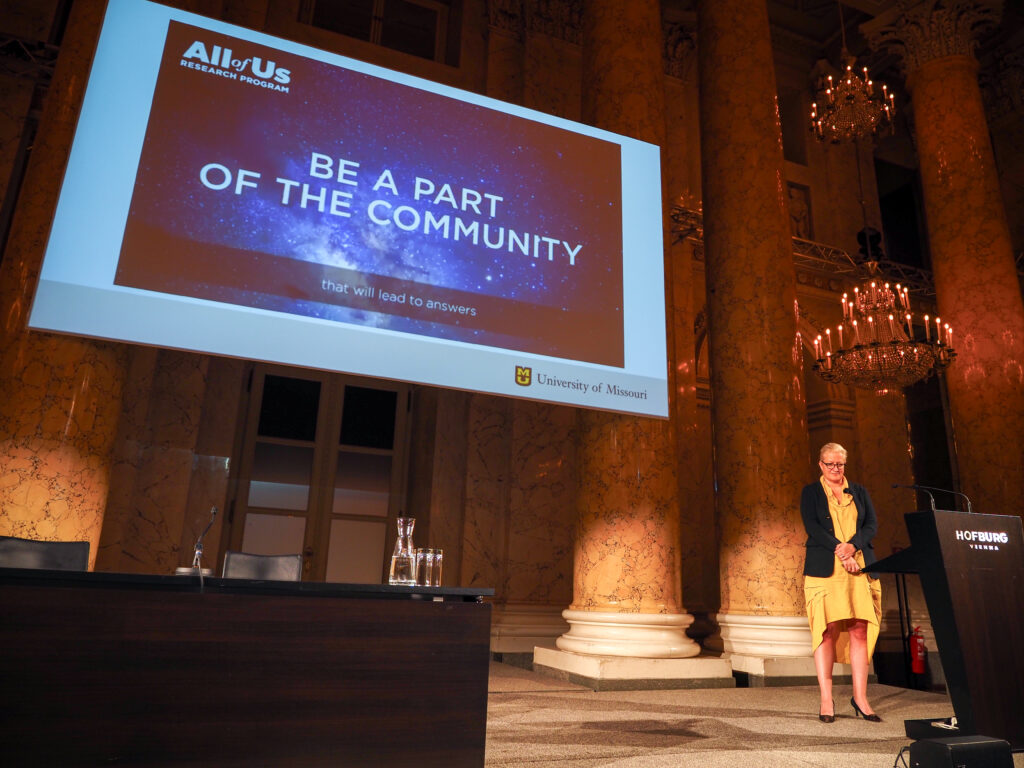
#EBW24 Live: Dr Gillian Bartlett, University of Missouri delivers keynote lecture II – ‘Biobanking with Underrepresented Populations: The Critical Role of Participant’
The second session of today’s EBW scientific programme was the keynote delivered by Dr. Gillian Bartlett, Associate Dean for Graduate Research Education at the School of Medicine at the University of Missouri. The subject of her talk was ‘Biobanking with Underrepresented Populations: The Critical Role of Participant’.
Dr. Bartlett spoke about the problems released to underrepresentation when it comes to robust and inclusive biomedical research. She highlighted the importance of including diverse populations in research to reduce bias, improve health outcomes and foster innovation.
Afterwards, she explained the reason why she spoke on this subject at EBW:
“It’s a very big passion of mine. I really want medical treatment to work and to suit the people who are being treated and I don’t want the patients being blamed for the treatment not working when it has not been developed for them. That was the reason why I thought it was really important to tackle this issue of diversity and underrepresented populations in biomedical research.”
Dr. Bartlett highlighted that “underrepresented” in biomedical research doesn’t refer to a minority of the population. Instead, it encompasses the majority when considering factors like gender, gender identity, age, and racial groups.
Reflecting on the steps needed to address gaps in samples and data, Dr. Bartlett underlined the importance for researchers to carefully examine the current participants and identify who is missing:
“I think the first step that needs to be taken, as they need to go back and take a really hard look at their participants and who are they and who is missing. Once they determine who is missing by virtue of who is in there, then they need to think about how do they reach those people? Where are they? What’s meaningful to them? How do they get into those communities and be visible and be trusted to have them engage, and so that the evidence coming out is meaningful for everyone.”
Dr. Bartlett also highlighted the altruism observed in people participating in research for the benefit of future generations, despite their own limited direct benefit:
“When you are there in the community building relationships, you find all kinds of amazing, wonderful people who are willing to do this, knowing that they may not benefit, but knowing that somebody like them will benefit, and maybe that person won’t go through as many negative experiences as they may have had.”
The keynote set the tone for the rest of EBW day three, with parallel sessions immediately after covering topics such as: ‘“Be aware of Biobanking” – Outreach and Communication in and for Biobanks’, ‘Citizen & Patient Involvement: Emerging best practices?’, ‘Epidemiological Biobanking – Cohorts as a show window for populations’ and ‘Getting more from less – liquid biopsies, biopsies and fine needle aspirates for molecular techniques’.
Dr. Gillian Bartlett
Dr. Gillian Bartlett is the Associate Dean for Graduate Research Education at the School of Medicine at the University of Missouri where she is also a tenured Professor in Biomedical Informatics, Biostatistics and Medical Epidemiology and the Director for the Translational Biosciences PhD program. Before being recruited to the US, she was a full tenured professor at McGill University holding the position of Associate Chair (Research) and Graduate Program Director in Family Medicine for over 10 years. In 2022, she was awarded the Distinguished Research Mentor Award by the North American Primary Care Research Group. For the last three years, Dr. Bartlett was the Chair of the Working Party for the Patient-Reported Indicator Surveys Project with the OECD involving 22 countries for this inaugural project in primary care.
Dr. Bartlett specialises in implementation science for translation of evidence into clinical practice. Her current concentration is on convergence science and stakeholder engagement around health care utilisation and outcomes for vulnerable populations; implementation of precision medicine using patient-oriented strategies; and the use of education innovations to advance the discipline of translational biomedicine. Dr. Bartlett was recently awarded, as Principle Investigator for Missouri, funding from the NIH All of Us program for the All of Us Heartland Consortium.